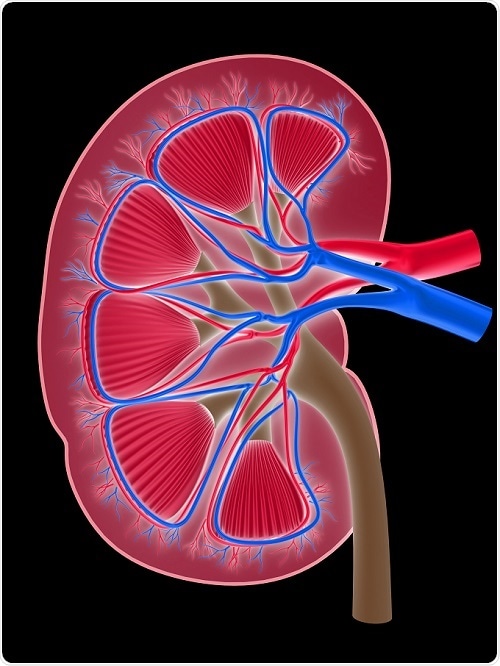A solitary kidney refers to the situation when a person has only one kidney or has two kidneys, but only one of them is functional. Although people with a solitary kidney can lead a normal and healthy life, some people with this condition are at a slightly increased risk of losing some kidney function later in life.
 High Blood Pressure Monitoring” />
High Blood Pressure Monitoring” />
©Sebastian Kaulitzki / Shutterstock.com
People with a solitary kidney should therefore be monitored carefully for signs of impaired kidney function. They should undergo regular testing for protein in the urine – an indicator that the kidney is leaking protein from the blood into the urine due to its impaired function. The glomerular filtration rate (GFR) should also be regularly tested (the glomeruli are tiny tubules in the kidney that filter the blood and an estimate of the glomerular filtration rate reflects how well this filtering process is working).
Causes of solitary kidney
The three main reasons a person may have a solitary kidney include the following:
Birth defects – In a condition called kidney agenesis, people are born with only one kidney. In another condition called kidney dysplasia, people are born with both kidneys, but only one of them is functional. People can still live full and healthy lives with a solitary kidney, so individuals with these birth defects often do not find out they only have one kidney until they undergo a test such as an X-ray or ultrasound scan for an unrelated problem.
Surgical removal of a kidney – In the case of kidney cancer, kidney injury or kidney disease, a person may need to have one of their kidneys removed. When this type of surgery is performed, both the kidney and the ureter (the tube that connects the kidney to the bladder) are removed.
Kidney donation – An increasing number of people are donating one of their kidneys for transplant to a friend or family member who has kidney failure.
Blood pressure monitoring
Patients with a solitary kidney should also have their blood pressure monitored, as there is a chance that they will develop hypertension (increased blood pressure). One of the functional roles of the kidneys is the maintenance of a normal blood pressure. The kidneys achieve this by regulating the flow of fluids through the blood stream and by producing a hormone called renin, which works in combination with other hormones to dilate or contract the blood vessels.
Many people with a solitary kidney develop a slightly raised blood pressure after a number of years. It is possible to have high blood pressure, proteinuria and a lowered GFR and still feel healthy, but it is important to ensure that these conditions are kept under control so that overall health and longevity are not affected.
A normal blood pressure is around 120/80 mmHg and a diagnosis of high blood pressure is made if this rises to over 140/90 mmHg. People with a solitary kidney should maintain their blood pressure at below 130/80 mmHg. Those who have a blood pressure higher than this should work with their doctor to keep the blood pressure below 130/80 mmHg.
Careful consideration needs to be taken over selecting a blood pressure medication. For example, two classes of drugs prescribed for hypertension that protect the kidney and reduce proteinuria are angiotensin-converting enzyme (ACE) inhibitors and angiotensin receptor blockers. However, both of these classes of drugs can be damaging to someone who has narrowing of the kidney arteries – a condition called renal artery stenosis.
Diuretics are another form of medication that can regulate blood pressure, by removing excess bodily fluids. In some cases, a combination of two or more drugs, along with dietary changes and physical activity changes, may be required to bring high blood pressure under control.
Sources
- www.niddk.nih.gov/…/facts.aspx
- www.kidney.org.uk/…/
- www.kidneyresearchuk.org/health-information/living-with-one-kidney
- http://www.kidneyurology.org/Library/Kidney_Health/Solitary_Kidney.php
Further Reading
- All Kidney Transplant Content
- Kidney transplant – What is a kidney transplant?
- When is a kidney transplant needed?
- How is a kidney transplant performed?
- Complications of kidney transplant
Last Updated: Feb 26, 2019

Written by
Sally Robertson
Sally has a Bachelor's Degree in Biomedical Sciences (B.Sc.). She is a specialist in reviewing and summarising the latest findings across all areas of medicine covered in major, high-impact, world-leading international medical journals, international press conferences and bulletins from governmental agencies and regulatory bodies. At News-Medical, Sally generates daily news features, life science articles and interview coverage.
Source: Read Full Article